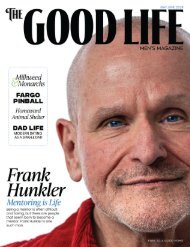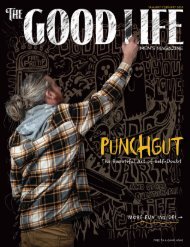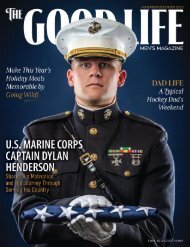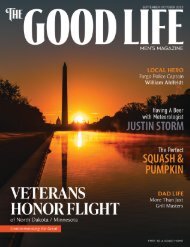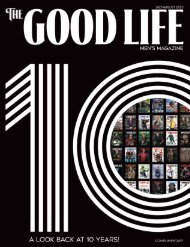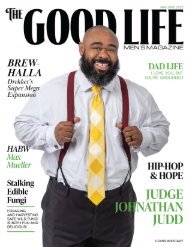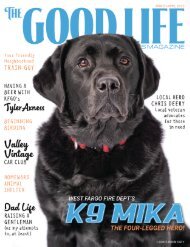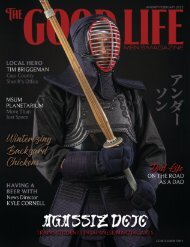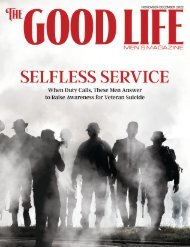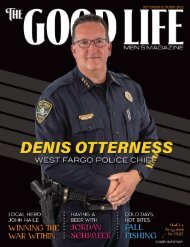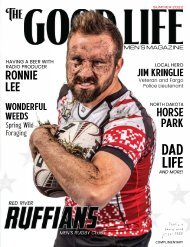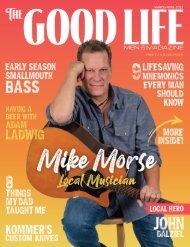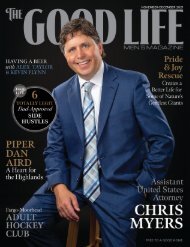The Good Life – July-August 2020
In this special 7 year anniversary issue of The Good Life Men's Magazine we honor our veterans and military heroes, sharing their remarkable stories once more. We are forever grateful to those who have sacrificed so much for our freedoms.
In this special 7 year anniversary issue of The Good Life Men's Magazine we honor our veterans and military heroes, sharing their remarkable stories once more. We are forever grateful to those who have sacrificed so much for our freedoms.
You also want an ePaper? Increase the reach of your titles
YUMPU automatically turns print PDFs into web optimized ePapers that Google loves.
ARMY VETERAN
you, but ask what I can do for my country.”
Like a pied piper, President Kennedy
convinced an entire nation that “giving and
volunteering” was the noblest and most
patriotic ideal any generation of collegeage
people could ever offer to do and pay
forward in the name of democracy, apple
pie and all that is wholesome in the world.
It was if some new brainwashing gimmick
befell an entire generation of young
people. Some slightly over 18-year-olds
or barely over twenty-one year olds and
just out of college graduates could be
found standing in long lines at malls and
in neighborhood parks began signing up
to join President Kennedy’s newly formed
American Peace Corps. A naïve and
very young diplomatic core of volunteers
offered their many talents and skills to
cross southern borders into other lands as
far away as Chile and Peru or fly across
the seas and oceans in an effort to “reach
out” to the masses of sick and often dying
children, parents and elderly people.
With only the very best intention and
usually with back breaking effort to teach
foreigners how to farm, grow gardens,
develop and build infrastructures within
their villages and tiny towns.
Within a year, thousands had boarded
buses and trains, drove in car pools or
hitch-hiked to the nearest Peace Corps
recruitment office to sign up for as long as
three and four year “tours of volunteering”
abroad. Many went to countries and
cities they had never heard of before to
lend their raw labor, talents and often
minimal skills to the poorest of the poor
who lived in filthy squalor, rampant with
contagious diseases, drinking and cooking
with polluted water. The infrastructure
consisted of dirty, dusty streets half
the year during dry periods and muddy
pits when it rained. The Peace Corps
volunteers worked tirelessly attempting to
teach and train their host countries people
how to function in a modern world so they
too, might live beyond the age of forty-five.
During the same time frame, Vietnam
was growing far beyond a mere political
conflict. By the end of 1964 and into
1965, Vietnam was a hotbed of blown up
villages and under-ground tunnels with a
neverending cycle of North Vietnamese
soldiers holding one single focus: take over
the land growing the main food supply for the southern hemisphere,
rice, while simultaneously enslaving civilian women and children.
Those Who Defend Go
After graduation from Ohio’s Central State College, as a Distinguished
Military Graduate, both the Air Force and the Army wanted to claim
Arthur Williams among their bravest and brightest. And while it wasn’t
a split second decision for Art to make, because Art’s dad was who he
was and Art wanted to be sure whatever he became it would be because
he earned it himself. Art opted to stay “Army All The Way.” Life was
complicated enough in those days for a black or multi-ethnic person.
Art recalls with bittersweet irony why he opted to take his ROTC Army
Commission after he graduated from college and explains it this way:
“My father was a well-known and respected Air Force Colonel who was
a Tuskegee Airman” during World War II. I needed to be sure whatever I
did, I would have earned it and it wasn’t given to me because of who my
dad was. If I had joined the Air Force, especially before my father retired,
I’m not sure I would have been totally certain something didn’t come my
way because of who my dad was.” Art felt he could do well in the Army
and he did.
For those who are not familiar with WW II history, Art Williams's father
(also known as “Art”) was among an elite group of Officers from World
War II. As a Tuskegee Airman, Colonel Williams went beyond his comfort
zone to become a Logistician and advisor within the US Government
and to other governments at the request of our government.”
urbantoadmedia.com / THE GOOD LIFE / 15




